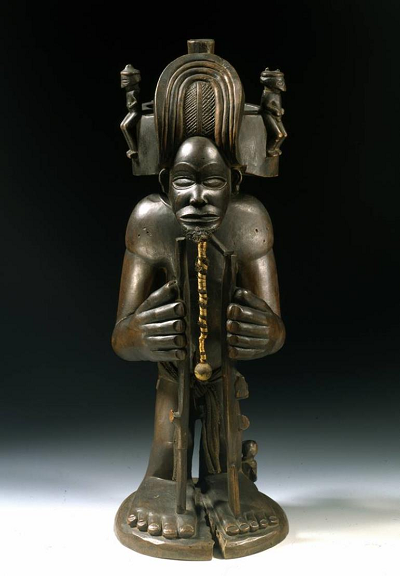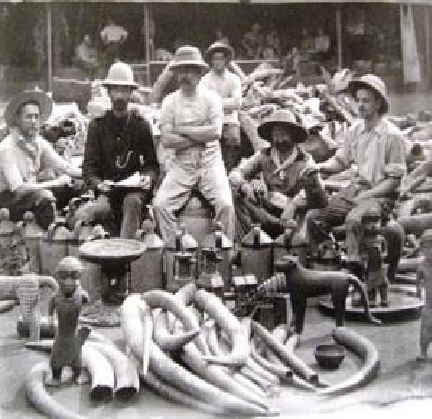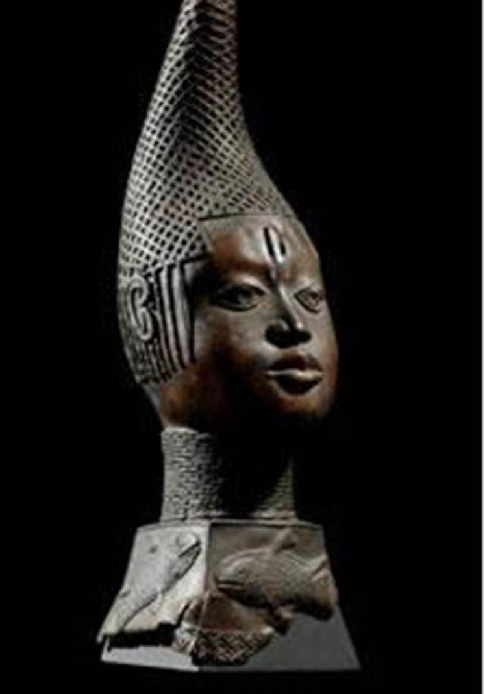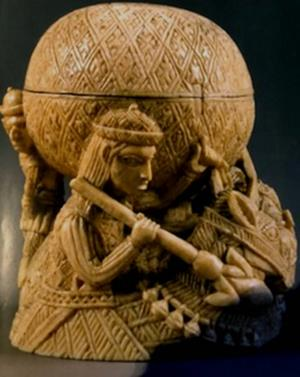MacGregor’s defence of Humboldt Forum: Post-Ouagadougou shadow-boxing

This article discusses about on-going efforts to return Benin artefacts that were stolen more than a century ago and are now on display in Western countries including Germany and France among others.
“There was a dim grandeur about it all, and also these seemed to a fate. Here was this head centre of iniquity, spared by us from its suitable end of burning for the sake of holding the new seat of justice where barbarism had held away, given into our hands with the brand of blood soaked into every corner and ... fire only could purge it, and here on our last day we were to see its legitimate fate overtake it.” – H. R. Bacon, Benin the City of Blood. [1]

Stool of Oba Eresoyen, Benin, Nigeria, now in Ethnologisches Museum, Berlin, Germany.
When I saw Neil MacGregor’s recent article in die Zeit [2], I was very keen to read it, for although I hardly agree with him on anything, I have always found his articles very interesting and thought- provoking. However, an insert on the same page indicated that MacGregor’s article was a response to a previous article by Hanno Rauterberg and so I decided to read first Rauterberg [3] and then the response of the Emeritus director of the British Museum.
Rauterberg begins his article entitled ‘ Schluss mit dem Falschen Frieden!(Stop the false peace) with a short account about the recent exhibition of three looted Benin bronzes in Hamburg, recounting the history of the brutal British invasion of Benin City in 1897,the looting of some 3500 Benin artefacts and the slaughter of hundreds of persons that preceded the burning of Benin City. The Benin artefacts are now in various western cities including Berlin, Hamburg, London, Stuttgart, and others.
Rauterberg reports that German museums are full of boxes of looted artefacts, some even not yet opened even though the museums are not willing to return the artefacts to the lawful owners as required by various United Nations /United Nations Educational, Scientific and Cultural Organisation (UNESCO) resolutions. He also refers to the Humboldt Forum that is to receive some of the 500,000 objects from the Ethnologisches Museum, Berlin.
Rauterberg’s article is full of information about the issues concerning looted artefacts and restitution. The author recounts the attempts made to recover looted artefacts but with no success. He adds that Neil MacGregor, Founding Director of the Humboldt Forum, would rather discuss other matters that talk about looted art and restitution.
When I turn to the article of Neil MacGregor, I immediately feel I am in a different world. It is very general in tone, it does not refer to any other article to be criticised and does not seem to be aimed at any critic although it is presented as an answer to the critics of the Humboldt Forum. I decided therefore to consider the article on its own merits.
MacGregor’s article entitled “There is not the single history” (Es gibt nicht die eine Geschichte) taking his cue from a Nigerian writer, Chimamanda Ngozi Adichie, who in a TED-Global conference, in a piece entitled, “The danger of a single story”, points out the danger of having just one stereotyped view of a people or a place. [4] Her college roommate seemed to have heard only of an Africa with wars, catastrophes, and poverty and was naturally surprised that Chimamanda Ngozi Adichie could speak English so well and did not correspond to her view of an African. MacGregor transposes this warning of a single story to the criticism of the Humboldt Forum but does not specify which critics have this one-dimensional view and how this one-dimensional view leads to a misunderstanding regarding the Humboldt Forum.

Chibanda Ilunga, Chokwe, Angola, now in Bode Museum, Berlin, Germany, on its way to Humboldt Forum, Berlin, Germany.
MacGregor refers to his experience in the British Museum with Nazi loot and how with full information from all sides there were eventual restitutions. Restitution of colonial imperialist loot of African artefacts is said by MacGregor to be more complicated but he does not examine any specific case of loot, for example, the loot of Asante gold in 1874 or the loot of Benin bronzes in 1897 with reference to restitution. He refers to the question of who really is entitled to receive colonial loot. He refers to India and suggests that the views of the Nobel Prize winner Amartya Sen on India’s colonial experience would be different from that of the writer and diplomat Shashi Tharoor. Is this really an argument at all, coming from a writer who starts by proclaiming that there is no single story but many stories and warns about one-dimensional perspective?
The underlying reasoning here is completely useless. Just because two Indian scholars would have different opinions as to whom looted artefacts should be returned, cannot be the reason for refusing to return a looted object. These two scholars have not been asked by the British Museum or any museum in a concrete case about their opinion. MacGregor is just speculating.

British soldiers of the infamous Punitive Expedition of 1897 proudly posing with the looted Benin artefacts
Supposing we found two Indian scholars supporting restitution to a particular person or institution in India, would the artefact be returned? What MacGregor is saying here is like a thief whose excuse for not returning an object to its owner is that from Glasgow he wanted to return the object to the owner in London and he met a scholar from Oxford who said it was a good idea but in London he met another scholar who said it was a bad idea. He therefore decided not to return the object. Are the opinions of scholars decisive here? When the British looted Indian artefacts, they did not consult with Indian scholars or elite. Why do they now seek to bring Indian scholars into discussions on restitution of looted artefacts in this way? Nor has there been any indication that if Indian scholars agreed on who was to receive the objects, they would be returned. This is just a game MacGregor and the universalists often play. They throw into arguments irrelevant facts and insinuations that may look good but when examined closely, turn out to have no direct relevance or solid basis.
It is noticeable that MacGregor who cites an African writer on the dangers of the single story does not cite any African writer on the specific problem of restitution of looted African artefacts. He refers to a Nigerian writer but not to the notorious British looting of Benin bronzes from Benin City in 1897. If Chimamanda Ngozi were to know how her idea has been used, she would be surprised. MacGregor and the Humboldt Forum have used the danger of the single story to bring in a notion of multi-perspectivity (an ugly word) which argues that the views of the German holders of looted Nigerian artefacts must be heard: they also have a story. Can multi-perspectivity go as far as to deny that it was the British who travelled all the way from Europe, killed Benin nobles, common people, women, and children, stole the Benin bronzes, and set Benin City on fire? These are the important questions that should be addressed and not a multiplicity of views that do not touch upon these issues.
MacGregor sees in the Humboldt Forum a great challenge to avoid a one-dimensional narrative. But he does not tell us where this danger of the single story is coming from, from the critics of the Humboldt Forum or the management of the institution? Is the danger from critics who complain that many looted objects are being displayed without giving the full history of their acquisition or the managers who authorise an exhibition, Unvergleichlich-Kunst aus Afrika im Bode-Museum, where the curators argue strongly for not providing information about certain artefacts in the absence of complete provenance research? [5]

Queen-Mother Idia, Benin, Nigeria, now in Bode Museum, Berlin, on its way to Humboldt Forum Berlin, Germany. How much more do German scholars still need to know about her before she can return to Benin, Nigeria, after an exile dating to 1897?
MacGregor refers to digital data banks and suggests that with their help, it would be possible to invite visitors from all over the world to the Humboldt Forum. The visit can only be virtual. Keep Nigerian artefacts but keep the Nigerians away from Germany. He did not mention that most visitors from Africa and Asia would not obtain a visa to visit the Humboldt Forum. The notions of shared knowledge and heritage he throws in do not help much. The other managers at the Humboldt Forum, such as Herman Parzinger, have interpreted shared heritage as meaning sharing knowledge about the artefacts with people from the deprived countries from which the objects were stolen. There was no question of sharing the artefacts. [6]
I once heard a discussion between a German professor and a broadcaster about looted African artefacts. The professor reported that he did his thesis on art in Togo but when he went there he realised that there were more Togolese artefacts in Ethnologisches Museum, Berlin than in Togo. Whereupon the broadcaster innocently asked if the solution then was to return a few artefacts to Togo. To her surprise, the professor said the solution was not to send artefacts to Togo but to share with the Togolese the knowledge the Germans had acquired about the artefacts.
MacGregor writes also about the possibilities of hearing recorded sounds, dances, songs, sounds and languages from other places that would make the Humboldt Forum a living place to hear these other elements that contribute to our various identities. Hardly anybody will argue against this, but does this go into the basic objections raised by critics?
My conclusion on MacGregor’s article is that it has two remarkable achievements: he has managed not to discuss seriously the main criticism of the Humboldt Forum, namely its inheritance of massive number of objects from the Ethnologisches Museum with dubious acquisition histories and the refusal to return some of the looted artefacts, such as the Benin bronzes about which the former director of British Museum clearly has abundant knowledge. The restitution of objects that were acquired through the notorious British invasion of Benin City is on the minds of most critics of the Humboldt Forum. [7]
An even more remarkable achievement of MacGregor’s article has been to write about looted artefacts in the Humboldt Forum in March 2018 without mentioning even once the most important event, as far as looted African artefacts are concerned: the Ouagadougou Declaration of 28 November 2017 by the French President Macron, criticising the detention of African artefacts in Western museums whereas African have no access to their own artefacts; the French President declared his intention to return some of these artefacts within five years and has indeed set up a committee to make recommendations on how the historic restitutions should be effected. [8]
We hope that at least the Humboldt Forum has noticed that the well-known art historian, Bénédicte Savoy, who resigned from their Advisory Board for lack of activity and the absence of a strong will to do provenance research of looted objects, has been invited by the French president Macron to make recommendations on restitutions of African artefacts from French museums.
Is it the view entertained in some circles that what the French are doing with respect to looted African artefacts can be of no relevance to the Humboldt Forum that will inherit undoubtedly looted artefacts? Friends of the Humboldt Forum as well as critics of the institution would expect the experienced founding director to express an opinion about Macron’s ideas and how these may affect the new institution. An open letter has been addressed by a group of scholars and activists to the German Chancellor, Angela Merkel, urging her to adopt a position similar to that of Macron. [9] Is all this of no relevance to the Humboldt Forum and its founding director MacGregor? Can someone who believes in a plurality of views and mentions African writers and Indian scholars not directly concerned with restitution of artefacts afford to ignore the views of the French President on this issue?
By sheer coincidence, the Humboldt Forum would be officially inaugurated at about the same time in 2019, as Macron’s restitutions would probably start. What an interesting situation! The French returning looted African artefacts and Germans saying they need more time to learn about objects that have been with them for more than 120 years.
On the whole, we had the impression that MacGregor was like a boxer, throwing punches at unnamed, invisible opponents who are absent from the ring but whose importance weighed on the mind of the experienced boxer; he could not wish them away but would not openly pay any attention to them or recognise their existence.
* Kwame Opoku is an independent commentator on African cultural affairs.

Saltcellar, Benin, Nigeria, now in Bode Museum, Berlin, Germany, on its way to Humboldt Forum, Berlin, Germany.
Notes
1. R. H. Bacon, Benin: City of Blood (pp. 107-108) cited by the great Expo Eyo, “Benin; The Sack that was”, http://www.edo-nation.net/eyo.htm
2. Zeit, Nr.14/2018.
I was very surprised to read that Neil MacGregor was responding to an article by Hanno Rauterberg. One fact I have learnt in all the years I have been writing on looted artefacts and restitution was that the supreme high priests of the Universal Museum never deign to respond to any normal writer however critical the article may be. This unnecessary duty, if it is to be done at all, is left to their subordinates to perform. Should the high priest deign to perform this annoying duty, by responding to some unknown upstart, they treat him with arrogant disdain and pour contumely on the unfortunate writer-tom flynn.blogspot.com/2008_04_20_archive.html
I learnt later that many consider it an honour to have been criticised by the arrogant high priests.
3. Zeit, Nr.11/2018
4. Chimamanda Ngozi Adichie: The danger of a single story - TED Talks
https://www.ted.com/talks/chimamanda_adichie_the_danger_of_a_.
5. K. Opoku, Humboldt Forum And Selective Amnesia: Research Instead of Restitution of African Artefacts...
https://www.modernghana.com/.../humboldt-forum-and-selective...
6. [PDF]looted/stolen cultural artefacts declared “shared heritage”
www.no-humboldt21.de/.../Opoku_SHARED_HERITAGE-4..pd.
7. K. Opoku, Germans Debate Legitimacy And Legality Of Looted Artefacts In ... -an... https://www.modernghana.com/.../germans-debate-legitimacy
8. French President Macron Creates Commission to ... - aachronym
aachronym.blogspot.com/.../french-president-macron-creates.htm.
After a Promise to Return African Artifacts, France Moves toward a Plan
https://www.nytimes.com/.../france-restitution-african-artifacts.ht...
After a Promise to Return African Artifacts, France Moves toward a Plan
https://www.nytimes.com/.../france-restitution-african-artifacts.ht...
9. See Annex.

Pwo Mask, Chokwe, Angola, now in Ethnologisches Museum, Berlin, Germany.
Annex
Open Letter to German Chancellor Angela Merkel: Restitution of cultural objects and human remains from Africa.
Mnyaka Sururu Mboro and Christian Kopp.
Berlin, 18/12/2017
Dear Dr. Angela Merkel, Chancellor of the Federal Republic of Germany,
With great interest we have noted the speech given on 28 November 2017 in Ouagadougou by the French President Emmanuel Macron, in which he stated that he was no longer “able to accept that a large part of the cultural heritage of several African countries is in France”. We welcome the fact that the French Government, in cooperation with the African countries concerned, wants to enable a “temporary or permanent restitution of the African heritage” within the next five years. We also pay tribute to Emmanuel Macron's announcement of restoring human remains from a colonial context of injustice to Algeria.
France is responding to the intensifying and critical debate on colonial heritage, which concerns the other countries of the Global North as well. After all, it is not only French museums and private collections that have come into possession of hundreds of thousands of cultural objects and tens of thousands of human remains from all regions of Africa as a result of colonisation. The number of African artefacts in the major ethnological museums of North America and Europe is so high that more than 90% of all cultural treasures have never been shown. The amount of human remains from Africa is so great that, according to the museums, even 100 years after their acquisition, it has still not been possible to determine where and how they came into the collections.
At the same time, especially the ritual objects and the remains of their ancestors are sorely missed by members of the African source communities.
Germany has a key role to play in this situation. For it is not only here that the greatest number of museums with cultural treasures and human remains from all parts of the African continent can be found. In 1884/85, at the invitation of the French Republic and the German Reich, the infamous Africa or Congo Conference took place in its capital Berlin. The rules for the almost complete division of Africa among the European colonial powers were negotiated, thus creating the preconditions for the systematic appropriation of African cultural objects and human remains.
At the beginning of the European Cultural Heritage Year 2018, which will be entitled “Sharing Heritage”, we would, therefore, like to ask you, in your capacity as German Head of Government, to take a stance on the historic initiative of the French President. In the 100th year after the end of German colonialism in Africa, the Federal Government must not remain silent on the subject of restitution of ritual objects and ancestral remains from a colonial context of injustice.
Without a transparent, transnational and critical examination of the colonial heritage, trustful cooperation between people of African and European origin will continue to be impossible.
With kind regards
Mnyaka Sururu Mboro & Christian Kopp
Berlin Postkolonial
[email protected]
Mobile: 01799 100 976
Further Signatories:
AfricAvenir International
Antirassistisch-Interkulturelles Informationszentrum ARiC Berlin
Arbeitskreis Panafrikanismus München
Arca-Afrikanisches Bildungszentrum
Artefakte/Anti-Humboldt
Berliner Entwicklungspolitischer Ratschlag (BER)
Deutsch-Afrikanische Gesellschaft (DAFRIG)
FuturAfrik – Forum für Globale Gerechtigkeit
Hamburg Postkolonial
Initiative Schwarze Menschen in Deutschland (ISD-Bund)
IDB | Institut für diskriminierungsfreie Bildung
Interkulturelles Frauenzentrum S.U.S.I.
Joliba – Interkulturelles Netzwerk in Berlin
Köln Postkolonial
Mainzer Arbeitskreis Südliches Afrika (MAKSA)
Netzwerk Rassismus- und Diskriminierungsfreies Bayern
OvaHerero, Mbanderu and Nama Genocides Institute (ONGI)
Solidaritätsdienst International (SODI)
Southern Networks for Environment and Development (SONED)
Millicent Adjei (Hamburg)
Aischa Ahmed (Berlin)
Prof. Dr. Iman Attia (Berlin)
Josephine Apraku (Berlin)
Prof. Dr. Marianne Bechhaus-Gerst (Köln)
Prof. Dr. Heike Becker (Kapstadt/Berlin)
Dr. Jule Böhnkost (Berlin)
Andreas Bohne (Berlin)
Dr. Anna-Maria Brandstetter (Mainz)
Clementine Burnley (Berlin)
Tahir Della (Berlin)
Hamado Dipama (München)
Prof. Dr. Lars Eckstein (Potsdam)
Ginga Eichler (Berlin)
Jahn Georg Fischer (Berlin)
Olga Gerstenberger (Berlin)
Prof. PhD Lerke Gravenhorst (Ahrensburg)
Dr. Noa Ha (Berlin)
Adina Hammoud (Berlin)
Mareike Heller (Berlin)
Dr. Anja Henebury (Zürich)
HMJokinen (Hamburg)
Dr. Natasha A. Kelly (Berlin)
Sonja Knees (Berlin)
Prof. Dr. Reinhart Kößler (Berlin)
Dr. Brigitta Kuster (Berlin)
Lucilla Lepratti (Berlin)
Hans-Christian Mahnke (Windhoek)
Prof. Dr. Christoph Marx (Duisburg-Essen)
Prof. Dr. Henning Melber (Uppsala)
Dr. Kavemuii Murangi (Silver Spring)
Katharina Oguntoye (Berlin)
Sharon Dodua Otoo (Berlin)
Prof. Dr. Ciraj Rassool (Kapstadt)
Anke Reule (Berlin)
Regina Sarreiter (Berlin)
Prof. Dr. Albert Scherr (Freiburg)
Prof. Dr. Michael Schnegg (Hamburg)
Alexander Schudy (Berlin)
Eric Van Grassdorf (Berlin)
Dr. habil Tilman Schiel (Bayreuth)
Sylvia Werther (Berlin)
Sigfried Wittig (Berlin)
Dr. Joachim Zeller (Berlin)
Extracts from statement by President Macron on restitution of African artefacts, 28 November 2017
“…I cannot accept that a large part of cultural heritage of several African countries is in France. There are historical explanations for that, but no valid justifications that are durable and unconditional. African heritage cannot only be in private collections and European museums. African heritage must be highlighted in Paris, but also in Dakar, in Lagos, in Cotonou, this will be one of my priorities. I want conditions to be met within the next five years for the temporary or permanent restitution of African heritage to Africa.
This will suppose a great deal of work and a scientific and museograhic partnership, because, make no mistake, in many African countries, it is often the African museum conservators and collectors who organised the illicit traffic and sometimes, it was the European museum conservators or collectors who saved these African artworks for Africa by wresting them away from the African traffickers, our common history is more complex than our reflexes!
But the best homage that I can pay not only to these artists but also to the Africans and Europeans who have fought to safeguard these works is to do everything so that the works return and to ensure that there is also security in Africa and also care for the protection of these works. Therefore, the partnerships will ensure that there are well-trained conservators, that there are academic commitments, that there are State to State commitments to protect these arts, that is, your history, your heritage and, if you permit me, our history’.
Le discours de Ouagadougou d’Emmanuel Macron. Le Monde Afrique, 29.11.2017 Restitution du patrimoine africain
… je ne peux pas accepter qu’une large part du patrimoine culturel de plusieurs pays africains soit en France. Il y a des explications historiques à cela mais il n’y a pas de justification valable, durable et inconditionnelle, le patrimoine africain ne peut pas être uniquement dans des collections privées et des musées européens. Le patrimoine africain doit être mis en valeur à Paris mais aussi à Dakar, à Lagos, à Cotonou, ce sera une de mes priorités. Je veux que d’ici cinq ans les conditions soient réunies pour des restitutions temporaires ou définitives du patrimoine africain en Afrique.
Ça supposera aussi un grand travail et un partenariat scientifique, muséographique parce que, ne vous trompez pas, dans beaucoup de pays d’Afrique ce sont parfois des conservateurs africains qui ont organisé le trafic et ce sont parfois des conservateurs européens ou des collectionneurs qui ont sauvé ces œuvres d’art africaines pour l’Afrique en les soustrayant à des trafiquants africains, notre histoire mutuelle est plus complexe que nos réflexes parfois !
Mais le meilleur hommage que je peux rendre non seulement à ces artistes mais à ces Africains ou ces Européens qui se sont battus pour sauvegarder ces œuvres c’est de tout faire pour qu’elles reviennent. C’est de tout faire aussi pour qu’il y ait la sécurité, le soin qui soit mis en Afrique pour protéger ces œuvres. Donc ces partenariats prendront aussi toutes les précautions pour qu’il y ait des conservateurs bien formés, pour qu’il y ait des engagements académiques et pour qu’il y ait des engagements d’Etat à Etat pour protéger ces œuvres d’art, c’est-à-dire votre histoire, votre patrimoine et, si vous m’y autorisez, le nôtre.’
